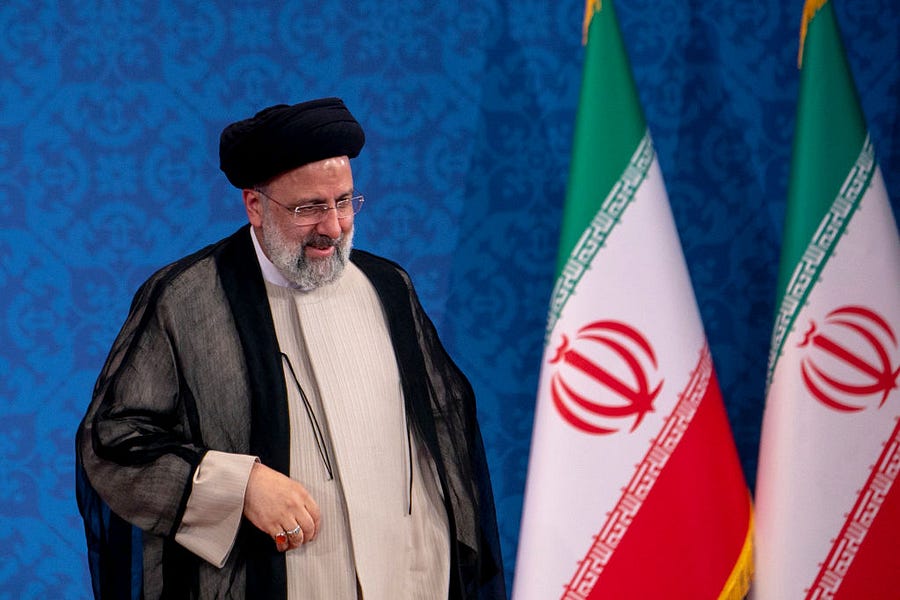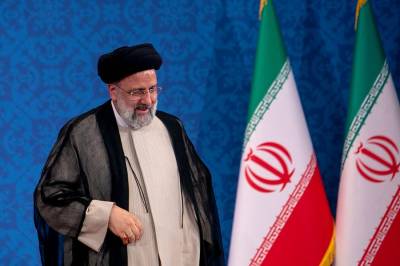There are bitter lessons aplenty about America’s 20-year and $2 trillion Afghan excursion. There are equally as many about the U.S.’s botched exit from that country this August, which has been dubbed “Biden’s debacle” by formerly favorable international outlets. Yet neither the horrendous scenes from the rapid Taliban takeover, the glee of U.S. adversaries, nor the domestic political debates that the withdrawal has deepened have managed to slow America’s eagerness to head for the exits in the Middle East. Despite the fiasco, the Biden administration’s desire for a regional drawdown continues apace.
When President Joe Biden proclaimed on August 31 that the Afghan withdrawal mission was an “extraordinary success,” he meant it. Not far behind was Secretary of State Antony Blinken, who called the airlift out of Kabul “an extraordinary effort” in his September 14 testimony to Congress.
That’s precisely because getting out of the way, no matter the facts on the ground or the wherewithal of the enemy to continue fighting, is fast shaping up to be a feature, not a bug, of the Biden administration’s approach to conflict zones across the Middle East. Nowhere is this truer than with respect to Afghanistan’s western neighbor, the Islamic Republic of Iran, whom Washington is trying to tempt back into compliance with the 2015 nuclear deal known as the Joint Comprehensive Plan of Action (JCPOA).
In fact, there is a direct line between the administration’s quest to resurrect the JCPOA and its Afghanistan exit. Both are borne out of a misguided belief that the region no longer matters and that the best thing Washington can do is de-escalate. The JCPOA is specifically desired by the Biden team to claim that an urgent (read: nuclear) threat inherited from its predecessor has been headed off and less time can be spent managing the Iran threat. Under such a scenario, the U.S. might “pivot” more assets, interests, and attention away from the Middle East to other parts of the world.
The problem? Iran’s nuclear escalation has become more than just a leverage- seeking exercise to get back to the deal. Tehran’s progress in enrichment purity and advanced centrifuge deployment coupled with its cost-free harassment, obfuscation, and pressuring of the International Atomic Energy Agency (IAEA) provides the regime with “irreversible” technical gains—which cannot be undone by resurrecting an accord that was weak even in 2015 to meet the nonproliferation challenges of 2021. There are also genuine and open-ended questions about the regime’s interest in JCPOA re-entry in the short term.
In both the Afghanistan and Iran-nuclear scenarios, the administration has explicitly chosen the option that diminishes the U.S. military footprint—and by default the threat of military force—while shedding most of its previous policy aims in the hopes of addressing a long-standing national security issue. Put differently, Washington is signaling that it doesn’t mind giving up the fight, a move which will invite more, not less, headaches.
Already, on at least three separate occasions since the U.S. left Afghanistan, Iranian officials have pressed their case for premature sanctions relief, hoping to build on their sense of America’s political desire for an agreement and an aversion to escalation and conflict. Perhaps this is why Iranian officials are more braggadocious about revealing their outright desire to expel America from the Middle East.
While the Biden administration still hopes that U.S. adversaries and allies alike read the past two decades of war as a marker of American resolve, it’s more likely that despite the sacrifice of more than a generation of U.S. and coalition servicepersons, the gains of the past two decades will be blurred by more recent images from the U.S. withdrawal and the Taliban reconsolidation. This is made plain in the commentary of Iranian officials who do not feel any inclination to concede.
On the balance sheet for adversaries, as expected, Iran’s Supreme Leader Ali Khamenei has framed the U.S. departure from Afghanistan as “a lesson for all countries,” and noted that the Taliban is back in power despite America’s early goal of regime change in Kabul. Not far behind is Iran’s chief of staff of the armed forces, Maj. Gen. Mohammad-Ali Bagheri, who proclaimed that the manner of the U.S. withdrawal was proof “of America’s accelerating decline.” More bluntly, Iran’s new president, Ebrahim Raisi, said in his first U.N. General Assembly (UNGA) address that, “Today, America is not exiting Iraq and Afghanistan, but is expelled.” Further afield, Hassan Nasrallah, the secretary general of Iran’s chief regional proxy, Lebanese Hezbollah, also weighed-in alleging the episode was a “moral downfall for America,” and that Washington, “evacuated the dogs who worked in the security forces, but not those who aided them.”
U.S. regional partners and allies appear justifiably spooked. The Kingdom of Saudi Arabia, for instance, has reportedly been partaking in direct and bilateral talks with the Islamic Republic amid reports that the U.S. is removing missile defenses from the region. The talks, which have been acknowledged, likely aim to change how Riyadh is seen by the Biden administration, but also read as another sign of hedging on Iran, a move driven by fears that Washington may not come to the aid of the Arab states of the Persian Gulf in the event of a potential conflict with Iran.
Prior to this, the UAE had begun to hedge on Iran policy as early as 2019 after Iran’s Islamic Revolutionary Guard Corps (IRGC) downed a U.S. drone over international waters and before it attacked oil installations in eastern Saudi Arabia using drones and land-attack cruise missiles. Then-President Donald Trump opted against kinetic action in both instances. During that time, the emirates instead elected to engage in a maritime security dialogue with the Islamic Republic and began to draw down its forces in Yemen where, along with Saudi Arabia, they had faced Iran’s newfound partner, the Houthi rebels.
Last but not least, while U.S. diplomats continue to talk with Israel about a Plan Bon Iran, one person’s Plan B may not read like another’s. At the time of this writing, Washington has yet to make the necessary public shift toward aggressively countering Iran through steps that would represent a de minimis diplomatic interest in using pressure against Tehran.
No matter the political spin in Washington, America’s adversaries today, like Iran, are more emboldened, willing to take more risks, and appear less restrained by the prospect of American military power than before. This point was driven home by the commander of the IRGC, Maj. Gen. Hossein Salami, who proclaimed that, “The America of today is not the America of the past 10, 20, or 30 years.”
There is a humbling lesson in all of this. Defeats do not exist in a strategic and political vacuum. Iran intends to capitalize on, not ignore, the lessons of the past two decades of conflict against America. So too, do American adversaries in the Indo-Pacific. Indeed, if there is any lesson to learn from the Cold War amid the era of great power competition, it is that while the direct conflict between the U.S. and USSR remained relatively cold—despite a few close calls—there were multiple hot spots and conflict zones around the world involving actors affiliated with both parties that could have quickly spiraled out of control. And in many instances, inferences about capabilities, intentions, and resolve were made and reapplied to other theaters.
Lest we forget, Iran had a 572-mile-long front-row seat to America’s way of war in Afghanistan. It even crossed that line multiple times to participate in the war by way of material support to the Taliban and attempts to buy off the government in Kabul. While the rise of the Taliban in 2021 presents Iran with new threats and opportunities, its ascendancy drives home two critical talking points for Tehran. First, that partnering with Washington will end in ruin, and second, that America was defeated in Afghanistan and can be defeated elsewhere, too. It’s up to the Biden administration to work with allies and partners to help reverse this impression, not to cement it.
As Washington again weighs sticks but only wields carrots on Iran, it ought not to forget that two decades ago, Iran was forced to restructure its atomic quest in what we now know was initially a crash program for five nuclear weapons. By most interpretations, U.S. military success against neighboring Iraq in mere weeks—the same Iraq that had taken Iran eight years to fight to a stalemate in the 1980s—was an outsized reason for the reorientation of Iran’s nuclear program and its faux-civilian veneer. The voluntary erosion of the U.S. military footprint from the region coupled with a JCPOA-centric Iran policy may just be the other “own goal” that the Islamic Republic needs from the Biden administration.
Wang Xiyue, a graduate student and former hostage in Iran, was most recently a Jeane Kirkpatrick fellow at the American Enterprise Institute (AEI). Behnam Ben Taleblu is a senior fellow at the Foundation for Defense of Democracies (FDD). The views expressed are their own.






Please note that we at The Dispatch hold ourselves, our work, and our commenters to a higher standard than other places on the internet. We welcome comments that foster genuine debate or discussion—including comments critical of us or our work—but responses that include ad hominem attacks on fellow Dispatch members or are intended to stoke fear and anger may be moderated.
With your membership, you only have the ability to comment on The Morning Dispatch articles. Consider upgrading to join the conversation everywhere.